
Dr Helmutt Weidlich, CEO, Institute of Prof DR George Kunz Gmbh, Germany, was in India last week. He inaugurated the World Food Day celebrations at Tamil Nadu Agriculture University in Coimbatore.
Weidlich said that India failed to take Ayurveda and Siddha medicines to the world market. He also said that what Indian Agriculture needed at present was strong cooperatives.
In this e-mail interview, the German Professor talks about Ayurveda, Indian agriculture and the impact of MNCs in the retail sector.
Was it after your visit to India that you got to know about Ayurveda?
No, Ayurveda is known to parts of the public in Germany, but mainly as a style of living or treatment for diseases, not so much as a category for food or nutraceuticals.
What impressed you about this branch of medicine?
More than 2000 years of heritage must have gathered some valuable empirical insight about products or treatments. It should be possible to use them even today.
Why did you say that India failed to take Ayurveda to the world market?
There are Ayurvedic centres and Ayurvedic teachers in different countries of the world.
However, as far as I can see, they have not entered the science-based officially approved level, outside India. They are confined to the esoteric, spiritual, not so serious, sometimes even ridiculed sector.
Click NEXT to read more...
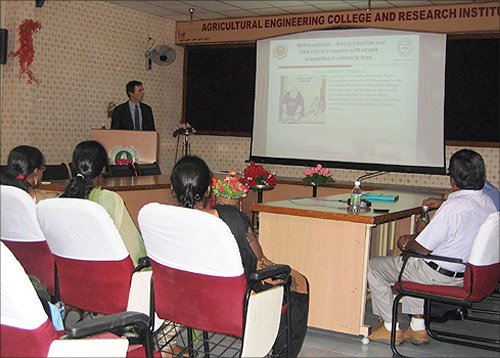
From an outsider's perspective, in what way can India take Ayurveda to the world?
Give scientific proof to its claims, according to the standards of evidence based medicine (if healing is concerned) respectively according to the EFSA-Health-Claims- Standard (if nutraceuticals for prevention are concerned).
Have you used Ayurveda therapy for any ailments? If so, how far has it helped you?
No, I have not used Ayurvedic therapy.
How do you think the world, and the West in particular, should look at alternative branches of medicine?
The world (or the West) should take the "alternative branches of medicine" as a source of proposed treatments and proposed nutraceuticals, should liberate them from the spiritual hocus-pocus and should test them with scientific biomarkers whether a cause consequence relationship between treatment/nutraceutical on the one hand and healing- or prevention-result on the other hand can be established.
The world should test the health claims of alternative medicine according to criteria of evidence based medicine and/or evidence based health care.
Click NEXT to read more...
The criticism against Ayurveda is that it does not employ the techniques of modern science with rigourous testing and documentation of drugs and therapies. It is the accumulated empirical wisdom handed down in certain texts. Given its base of accumulated traditional wisdom, how much do you feel Ayurveda could benefit by adapting to modern technology?
I think we have to distinguish two different sorts of "accumulated empirical wisdom" here.
a. There is the accumulated empirical wisdom which can be described in terms which are accessible to objective measurement. (Example: "In order to prevent disease X, take a potion of Y per day". There "X" can be described scientifically and "Y" can be described scientifically.
Thus, a cause consequence relationship between the two can be measured in an objective way.) This part of accumulated empirical wisdom can be tested according to modern standards. That should be done and should be published in order to become an accepted part of modern empirically based science.
b) Apart from that there is the "accumulated empirical wisdom" which cannot be described in terms which are accessible to objective measurement (Example: These pseudo-explanations such as that vata- pitta-kapha-thing.) Those are comparable to the pseudo-explanations which were in fashion in Europe in the middle-ages (alchemy, witch-craft, blood-letting as a cure to all diseases etc.) They should be addressed to the folklore sector and left alone there.
If Ayurveda-teaching does not get rid of this part, then it will remain in this marginalized, esoteric, spiritual, not so serious, sometimes even ridiculed sector.
Let me say it in different words: If it really is "accumulated empirical wisdom handed down in certain texts" then it must be accessible to modern objective measurement-techniques. If it is not accessible to modern objective measurement-techniques then it is not "wisdom" but "fantasy handed down in certain texts".
Click NEXT to read more...
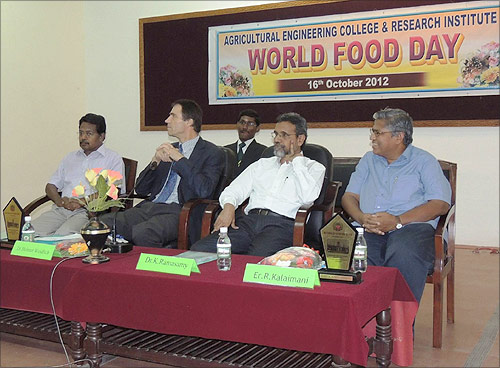
How do you see the agricultural scene in India which is a paradox; the country produces enough food grains but the needy cannot access it and a lot of it eaten away by rodents and vermin?
That description of the paradox is valid for India as it is valid for the world in total. From my point of view, it is due to historical reasons why that paradox is so drastically encountered in India.
We as a world population, or India as a country, have not yet managed to channel the egoisms of the individuals in such a way that there is no one left dying from starvation.
It is a tragedy, it is a guilt that we all are loading upon us, but we have not yet found the organizational means to get the surplus food away from the rodents to the needful humans.
It is not so much an agricultural problem as a distribution problem. I think that India should consider stronger intervention by the (Federal-State-or Municipal) government in respect of garbage removal from the streets and distribution of a minimum amount of food, life-goods and education to everyone.
You said in Coimbatore that co-operatives are the answer to many of India's agricultural problems. The white revolution in India started by Dr. Kurien is a success story in creating milk co-operatives. Kurien's efforts resulted in releasing the dairy farmer of Gujarat from the clutches of monopolies. It also helped the farmer get a better price and the savings shared by the members of the cooperative. Did you mean similar co-operatives in agriculture too?
For me, cooperative means that private individuals or families work under the umbrella of some cooperative (doing collective decision making) in order to give them more selling power, buying power, development power; more such power than any individual could possibly have if the individual goes his way alone. (This is different form the kolchose-system (Kolkhoz in Russian is transliterated this way in German and means collective farming) where the formerly private land is being seized and decisions are handed top down to the subjects.)
Click NEXT to read more...
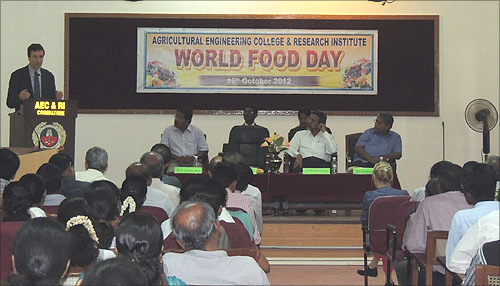
While opening up the retail market to multi-national chains, the authorities here claim that it would benefit the farmer with a better price. What is your opinion on this?
No, it does not work like this. In order to predict what will happen if you open the retail market for more multinational chains, you have to consider what the multinational-retail chains are doing: Buy the goods from where they are good enough and cheapest and sell them to the consumers at prices lower than the competition can sell them.
In Europe, in US, in probably all parts of the world where multinational retail chains comprise a significant part of the food market, the prices paid to the farmers have not been increased but rather decreased.
On the other hand, the prices asked from the consumers have decreased as well. So that squeezed out many if not all of the small mom-and-pop-retail-shops in the food sector, wherever the big multinationals appeared.
There is no doubt that introducing the multinationals will make the agri- and food-sector more competitive, will lead to higher quality products, and both of that is good for the consumer. But it has clearly to be seen, that the small mom-and-pop-retail shops will disappear and that prices paid to the farmers will be decreased.
The best measure to counter the purchasing power and logistical advantages of the multi-national retail chains is for the farmers to organize in cooperatives and do product marketing and selling by those cooperatives.
We can clearly see that in Europe, where for instance milk prices have been driven so low (both for the farmers as for the consumers) by the multinationals that farmers simply cannot survive. It is only through doing the sales activities by large farmer-cooperatives that they managed to get the prices to acceptable levels again.
Click NEXT to read more...
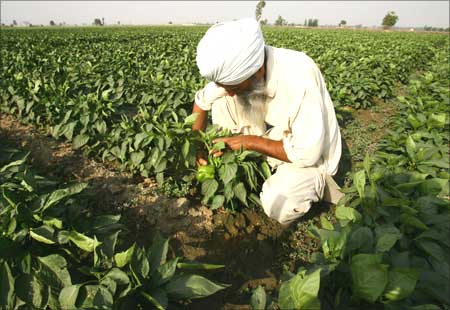
Do you feel cooperatives are ethically superior to huge retail chains, given that the benefits of eliminating the middleman would be in the producers' hands and not be taken away from the country?
I don't think that agricultural cooperatives should also do the sales function to the consumer.
They should rather cover the production and part of the logistics (from farmer to centralized food processing units) and sell the goods collectively to the retail sector (be the retail sector organized in small family owned units or be it organized by multi-nationals).
I do not know of any agricultural cooperative which has been extremely successful as retailer. Therefore I do not encourage agricultural cooperatives to venture into retail activities.
If cooperatives can be a better answer, is there some problem with the idea, since private enterprise only is doing the work in most parts of the world and cooperatives, wherever they exist and are successful are an exception?
I'm not sure whether your statement is right. There are very powerful cooperatives on the world market: Beraca, Embrapa are very powerful cooperatives of Brazilian farmers producing grains such as soy, maize etc. in large quantities and competing very successfully with international private companies like Cargill, ADM and others.
The German retail chains REWE and EDEKA are among the biggest in Europe, yet they started as and still are cooperatives of small private retail-shops. That is to show, that there are sufficient role models for successful cooperatives.
However, as mentioned before, I do not know any cooperative worth to mention which serves as agricultural cooperative as well as retail cooperative. It appears that you have to decide clearly on which side of the trade you are playing your cooperative.
Click NEXT to read more...
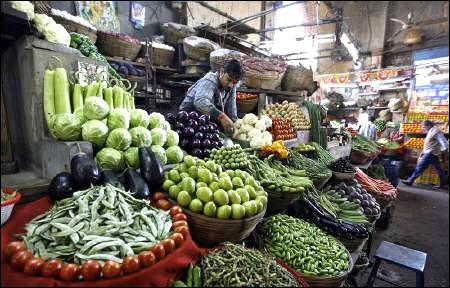
In what way is The Netherlands a success story in creating co-operatives in agriculture?
The Netherlands is not predisposed to become Europe's vegetable basket due to its geographical latitude.
Nevertheless the Netherlands managed to become exactly that by development, application and marketing of vegetables which are grown under glass.
This has been achieved by cooperation of all stake holders in that business virtually on a national basis: scientific development of technologies for plant development, growers, marketing organizations.
That outpaced all other countries in Europe and their growers organisations. But please be aware, that this was cooperation on the supply side, it did not venture into retail-activities.
Would it be realistic to assume that strong cooperatives can be built?
Yes, I mentioned the role models. As I see it, it takes a clear decision on which side of the trade you want to be active (agriculture or retail), takes a good cooperation with your local Universities, takes good activities and ... a lot of members cooperating.